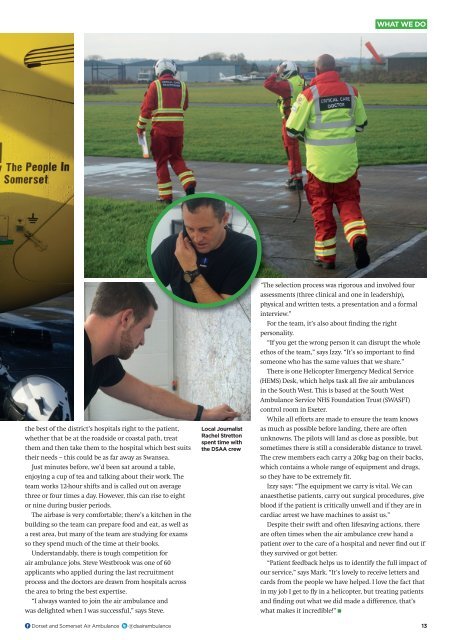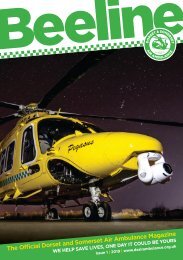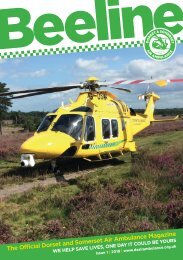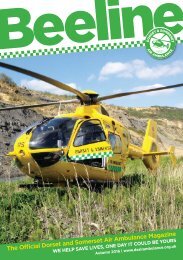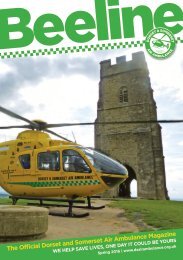DSAA Beeline, Issue 1 2017
Dorset & Somerset Air Ambulance, official magazine Spring 2017. We help save lives, one day it could be yours.
Dorset & Somerset Air Ambulance, official magazine Spring 2017.
We help save lives, one day it could be yours.
Create successful ePaper yourself
Turn your PDF publications into a flip-book with our unique Google optimized e-Paper software.
WHAT WE DO<br />
the best of the district’s hospitals right to the patient,<br />
whether that be at the roadside or coastal path, treat<br />
them and then take them to the hospital which best suits<br />
their needs – this could be as far away as Swansea.<br />
Just minutes before, we’d been sat around a table,<br />
enjoying a cup of tea and talking about their work. The<br />
team works 12-hour shifts and is called out on average<br />
three or four times a day. However, this can rise to eight<br />
or nine during busier periods.<br />
The airbase is very comfortable; there’s a kitchen in the<br />
building so the team can prepare food and eat, as well as<br />
a rest area, but many of the team are studying for exams<br />
so they spend much of the time at their books.<br />
Understandably, there is tough competition for<br />
air ambulance jobs. Steve Westbrook was one of 60<br />
applicants who applied during the last recruitment<br />
process and the doctors are drawn from hospitals across<br />
the area to bring the best expertise.<br />
“I always wanted to join the air ambulance and<br />
was delighted when I was successful,” says Steve.<br />
Local Journalist<br />
Rachel Stretton<br />
spent time with<br />
the <strong>DSAA</strong> crew<br />
“The selection process was rigorous and involved four<br />
assessments (three clinical and one in leadership),<br />
physical and written tests, a presentation and a formal<br />
interview.”<br />
For the team, it’s also about finding the right<br />
personality.<br />
“If you get the wrong person it can disrupt the whole<br />
ethos of the team,” says Izzy. “It’s so important to find<br />
someone who has the same values that we share.”<br />
There is one Helicopter Emergency Medical Service<br />
(HEMS) Desk, which helps task all five air ambulances<br />
in the South West. This is based at the South West<br />
Ambulance Service NHS Foundation Trust (SWASFT)<br />
control room in Exeter.<br />
While all efforts are made to ensure the team knows<br />
as much as possible before landing, there are often<br />
unknowns. The pilots will land as close as possible, but<br />
sometimes there is still a considerable distance to travel.<br />
The crew members each carry a 20kg bag on their backs,<br />
which contains a whole range of equipment and drugs,<br />
so they have to be extremely fit.<br />
Izzy says: “The equipment we carry is vital. We can<br />
anaesthetise patients, carry out surgical procedures, give<br />
blood if the patient is critically unwell and if they are in<br />
cardiac arrest we have machines to assist us.”<br />
Despite their swift and often lifesaving actions, there<br />
are often times when the air ambulance crew hand a<br />
patient over to the care of a hospital and never find out if<br />
they survived or got better.<br />
“Patient feedback helps us to identify the full impact of<br />
our service,” says Mark. “It’s lovely to receive letters and<br />
cards from the people we have helped. I love the fact that<br />
in my job I get to fly in a helicopter, but treating patients<br />
and finding out what we did made a difference, that’s<br />
what makes it incredible!”<br />
Dorset and Somerset Air Ambulance @dsairambulance 13<br />
12-13 <strong>DSAA</strong>_Dorset_Echo.indd 13 09/03/<strong>2017</strong> 09:43


